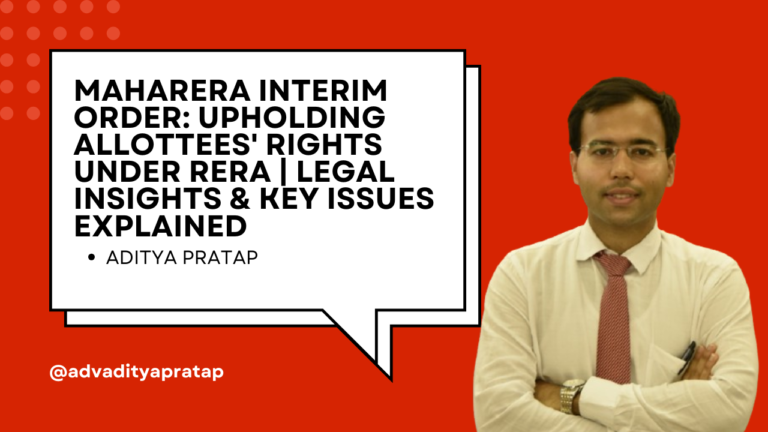
MahaRERA’s Interim Order: Upholding the Rights of Allottees under RERA
Background of the Case
A significant interim order was issued by MahaRERA in a case concerning the delayed possession of a flat allotted under a Permanent Alternate Accommodation Agreement (PAAA). The Complainants sought possession of their allotted flat, interest for the delay in possession, and other reliefs as per Section 18 of the Real Estate (Regulation and Development) Act, 2016 (RERA).
The Respondents contested the maintainability of the complaint by filing a miscellaneous application. They argued that MahaRERA lacked jurisdiction, asserting that the Complainants were tenants of a redeveloped building and not allottees under Section 2(d) of RERA. Furthermore, the Respondents claimed that the PAAA did not qualify as an agreement for sale under Section 2(c) of RERA. They contended that the complaint was an attempt to misuse the provisions of RERA and sought dismissal of the complaint on jurisdictional grounds, relying on previous rulings.
Key Issues
A. Allottee Status:
The central issue was determining whether the Complainants qualified as allottees under Section 2(d) of the Real Estate (Regulation and Development) Act, 2016 (RERA). This depended on their payment for an additional area in the sale wing of the project. The Complainants argued that their agreement for the additional area met the criteria of a sale agreement under Section 2(c) of RERA, thus establishing their status as allottees.
B. Violation of RERA Provisions:
Another key issue was whether the delay in handing over possession of the flat constituted a violation of Section 18 of RERA. This provision entitles allottees to interest for delayed possession, and the Complainants sought to claim such interest for the delay in possession of their allotted flat.
C. Jurisdictional Challenge:
The Respondents raised a challenge to MahaRERA’s jurisdiction over the case, arguing that it involved tenants under a Permanent Alternate Accommodation Agreement (PAAA) and not allottees. They contended that because the Complainants were tenants, not allottees under Section 2(d) of RERA, the matter fell outside MahaRERA’s purview.
Arguments Advanced by Advocate Aditya Pratap
Advocate Aditya Pratap, representing the Complainants, presented detailed arguments to defend their claims and establish their entitlement to relief under RERA:
A. Allottee Status:
Advocate Aditya Pratap argued that the Complainants qualified as allottees under Section 2(d) of the Real Estate (Regulation and Development) Act, 2016. This was based on their payment for an additional area in the sale wing of the project. The agreement for the additional area, as contended, met the criteria of a sale agreement as defined under Section 2(c) of RERA.
B. Violation of Provisions:
The delay in handing over possession was highlighted as a violation of Section 18 of RERA, which entitles allottees to interest for delayed possession. Advocate Aditya Pratap refuted the Respondents’ argument that the Complainants were mere tenants and therefore ineligible to file a RERA complaint. It was emphasized that the agreement explicitly conferred ownership rights over the additional area, establishing their status as allottees under the Act.
C. Reliefs Sought:
The dismissal of the Respondents’ miscellaneous application, which challenged MahaRERA’s jurisdiction to hear the case, was sought. Recognition of the complainants as legitimate allottees under the provisions of RERA was requested, ensuring their right to seek remedies for the delayed possession. Advocate Aditya Pratap urged MahaRERA to proceed with the main complaint and adjudicate it on its merits to secure justice for the Complainants.
Arguments Advanced by the Opposite Party
The Respondents, through their counsel, filed a miscellaneous application and raised the following points:
A. Jurisdictional Challenge:
The Respondents argued that MahaRERA lacked jurisdiction, claiming the Complainants were tenants under the PAAA and not allottees under Section 2(d) of RERA.
B. Misuse of Provisions:
The Respondents alleged that the Complainants were attempting to enforce a PAAA before MahaRERA, which was beyond its purview. They contended that disputes arising from agreements for alternate accommodation fall outside RERA’s scope and must be adjudicated elsewhere.
C. Precedents Cited:
The Respondents relied on previous rulings, including Shravankumar Pardeshi vs. M/s Sagar Shopping Developers, to argue that agreements for alternate accommodation do not fall under Section 13 of RERA.
Observations and Interim Ruling by MahaRERA
A. Rejection of Miscellaneous Application:
MahaRERA rejected the miscellaneous application filed by the Respondents, which sought the dismissal of the complaint at the preliminary stage. The authority emphasized that it was not appropriate to dismiss the complaint solely based on the jurisdictional challenge at this stage. It stated that the determination of the Complainants’ status as allottees under Section 2(d) of RERA required a detailed examination of the facts, including the agreement and the nature of payments made by the complainants. MahaRERA noted that such an evaluation could not be done merely at the preliminary stage without a thorough review of all relevant details.
B. Complexity of Issues:
MahaRERA observed that the issues raised by both parties were legally and factually complex. This included understanding the specific terms of the Permanent Alternate Accommodation Agreement (PAAA), the payments made by the Complainants for the additional area in the sale wing of the project, and how these payments corresponded to the provisions of RERA. The authority also noted that the interpretation of the agreement itself, along with the question of whether the agreement constituted a sale agreement under RERA, required an in-depth analysis. Furthermore, the applicability of RERA provisions to the PAAA was also a key point that needed careful consideration in the case.
C. Hearing on Merits:
MahaRERA adjourned the case and scheduled the next hearing to allow both parties to present their claims and defenses in full. The authority made it clear that the substantive issues, including whether the Complainants were entitled to relief under RERA for the delayed possession, would be addressed in detail at a later stage. The hearing would focus on evaluating all the facts, legal arguments, and evidence provided by both sides. The final decision would be made only after a comprehensive examination of the case on its merits.
Image Generation Prompt for Meta AI:
“Create an image of a courtroom scene with a focus on a legal dispute involving real estate. In the center, a judge sits at the bench with legal documents and a gavel. On one side, a lawyer presents arguments to the judge, and on the other side, another lawyer listens attentively. The courtroom is formal with wood-paneled walls, a flag in the background, and legal books on the sides. The atmosphere is serious and professional, with a sense of anticipation in the air. The lawyers are dressed in formal legal attire, and the focus is on the legal proceedings and the argument over real estate law.”

About the Author
Aditya Pratap is a practicing lawyer and founder of Aditya Pratap Law Offices based in Mumbai. An alumnus of NALSAR University of Law, Hyderabad, he has over 11 years of experience and has handled numerous cases of public and private significance. For more insights, you can visit his website: adityapratp.in. Watch him in TV interviews.